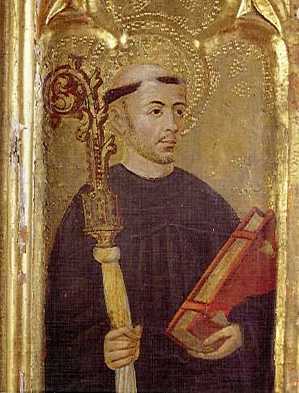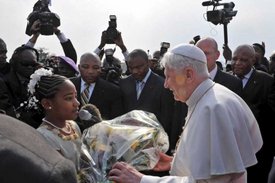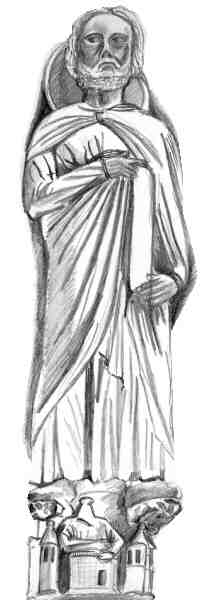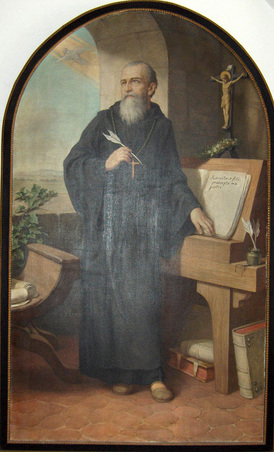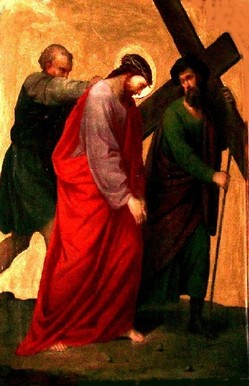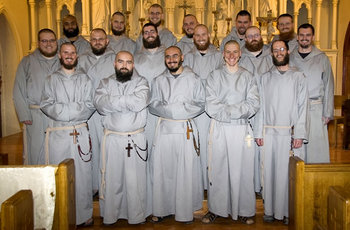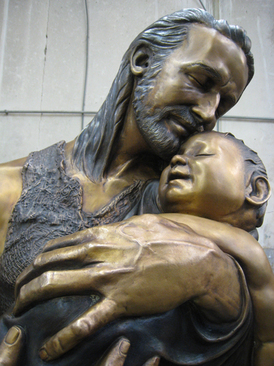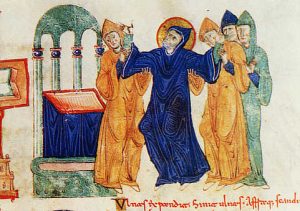 Let the whole multitude of the faithful exult in the glory of our beloved Father Benedict; but most of all let that army of monks be glad who on earth are celebrating the feast of him with whom the Saints in heaven are rejoicing. (Magnificat antiphon)
Let the whole multitude of the faithful exult in the glory of our beloved Father Benedict; but most of all let that army of monks be glad who on earth are celebrating the feast of him with whom the Saints in heaven are rejoicing. (Magnificat antiphon)
Today was a glorious day. The weather was particularly beautiful and the grounds of the Abbey and College were manicured on Friday plus the flowering trees are bursting forth with color. Our many guests attested to value of the charism of Saint Benedict and the witness of the monastic community here in the Charlotte metro area. We can say that the monks and friends are intertwined in a very real way.
The 4th bishop of the Diocese of Charlotte, the Most Reverend Peter J. Jugis, JCD, presided his choir robes and many priests of the diocese concelebrated the Mass with Father Abbot Placid Solari, celebrating. All of the monks and guests staying at the abbey were present. It was particularly fitting to have some of the priests of the diocese who in some way collaborate with the abbey here because of the strong connection that exists between the abbey and the diocese: the abbey was the seat of the diocese and the monks either founded and staffed some of the parishes or provided weekend assistance. Heartwarming for me was the clear sense of fraternal love and unity with Saint Peter in the Episcopal office with the presence of Bishop Jugis because there are monasteries live in friction with the local bishop and by extension the Holy Father. Hence it was evident to me that there’s been a genuine affection between the bishop and the monks. I’d be remiss if I didn’t mention the presence of the Religious Sisters of Mercy. They’ve held a close relationship with the monks of this abbey since the 19th century and the monks continue to be their chaplains down to today.
As an historical note, the Holy See erected the Diocese of Charlotte on January 12, 1972. But beginning in 1944 and then again in 1960 the territory of the abbey nullius was gradually restricted before being suppressed on January 1, 1977, at the request of the US bishops.
In the homily Father Abbot spoke of Saint Benedict personally hearing the voice of Christ calling him to follow. As Benedict listened with the ear of his heart, so we should listen to the call of the Master (Christ). We know that through baptism we are reborn as adopted children of God and our lived experience tells us that we are being formed into saints, or at least the hope is that we’d become saints. Being a saint, however, is not being a plastic sort of character but a person who really lives what his conviction in Christ is. It’s the saint that lets know that God is real and that His love and creative power endures; it’s the saint that knows and shows us that the divine promise is a fact. Two aspects of this the divine promise bear mentioning because they are constituent parts of Benedict’s life: forgiveness (mercy) and providence (life will be set right). In forgiveness our sins are forgiven and we are given the grace to transform our lives from ugliness to beauty. Providence tells us that we don’t hold others hostage for their sinfulness toward us; just as the Lord forgives, so ought we to forgive. Providence is the revelation of hope, that there all of us have a destiny based on faith in Christ.
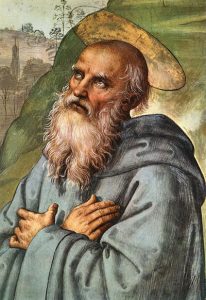 The abbot also noted for us that Benedict is an example of being “watchful” in the face of grace and sin; he was attentive to sustaining others in the struggle against Satan. One can say, therefore, that Benedict is a living Gospel: he lived the Gospel faithfully and his witness to Christ was substantial. While it seems odd that on a joyous occasion such as this feast to tell people to keep death before our eyes as Benedict admonished his monks, it is nevertheless true that we ought to do so because it is an expression of Christian hope: we desire our destiny, we desire the infinite. As Pope Benedict reminded us in last encyclical, the distinguishing mark of the Christian is that we know we have a future. Just as Saint Benedict was converted, the abbot said, by the Paschal Mystery of the Lord, so by that same Mystery shall we be transformed if we give ourselves over the Lord without reserve.
The abbot also noted for us that Benedict is an example of being “watchful” in the face of grace and sin; he was attentive to sustaining others in the struggle against Satan. One can say, therefore, that Benedict is a living Gospel: he lived the Gospel faithfully and his witness to Christ was substantial. While it seems odd that on a joyous occasion such as this feast to tell people to keep death before our eyes as Benedict admonished his monks, it is nevertheless true that we ought to do so because it is an expression of Christian hope: we desire our destiny, we desire the infinite. As Pope Benedict reminded us in last encyclical, the distinguishing mark of the Christian is that we know we have a future. Just as Saint Benedict was converted, the abbot said, by the Paschal Mystery of the Lord, so by that same Mystery shall we be transformed if we give ourselves over the Lord without reserve.
One may note in the Ordo for liturgical services that March 21 is a liturgical memorial of Saint Benedict, co-patron of Europe and Father of Western monasticism. The ritual form of today’s sacred Liturgy takes on different observances in the various worldwide congregations of Benedictine monasteries. That is to say, some monasteries observe today as a solemnity even though it is Lent; let us not forget that March 21st comes between two other solemnities, Saint Joseph (March 19) and the Annunciation of the Lord (March 25). Monasteries who don’t keep today as a solemnity will keep liturgical memorial as a simple feast and celebrate July 11 as a solemn day.
By the use of the word “solemnity” I mean the use of festive hymns and antiphons for the saint or the Lord are sung, incense and white vestments are used, and the Gloria is sung and the Creed recited at Mass. The above Magnificat antiphon is a good example. Therefore, the special Mass texts written and approved for the liturgical memorial are used in conjunction with the sung Ordinary of the Mass. On days of solemnity the community will have a festive meal with special foods and prepared and often wine is served. The opposite would be true for a day in Lent or an average in Ordinary Time where things are much more sober. I savor today as a solemn break from the joy of Lent!
For the monks of Belmont solemnities never end: the anniversary of the Dedication of the Abbey Church falls on March 28 but that day, even though it is a solemn occasion, will be simplified I can assure you. All these special celebrations can obscure the sober liturgical sense that’s supposed to be followed for Lent and yet there is a particular Catholic sense of the Incarnation that’s manifested when we properly observe feasts on their proper days. Given that Mary, Help of Christians – Belmont Abbey is a monastery of the American-Cassinese Congregation of Benedictine monks it’s keeping to a privilege granted in 1972 by the Sacred Congregation for Divine Worship.
At the solemn Vespers last eve, the Father Abbot was suitably decorated in mitre with crosier, symbols of his office as a head of the abbey. A special vesperal hymn for the Transitus of Benedict, “Whate’er of Yore,” was sung. According to Father Prior this hymn is of unknown provenance and yet highly revered. It speaks of the prophets and the Law, Abraham and Moses, perfect virtue, especially asceticism, obedience and peace viz. the witness of blessed Benedict amidst the storms of era.
The lyrics bear our attention:
Whate’ver of yore the tuneful prophets teach
Or Law of olden days,
Great monarch of ascetic multitudes,
Thy life displays.
A glorious progeny is Abram’s boast;
Meekness in Moses shone;
Faultless obedience and a beauteous spouse
Were Isaac’s crown.
But our exalted heav’nly Patriarch,
Immeasurably blest,
Concentrates all their glory, virtue, praise,
In his sole breast.
O may his arm of might that caught us up
From the world’s stormy tide,
Here keep us evermore where halcyon calm
And peace abide.
Glory eternal to the Father be,
And sole-begotten Son,
With Thee Great Paraclete: eternal Three
And trinal One.
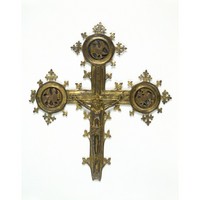 In the Bible the cross is the expression of a life that is completely being for others. It is not man who goes to God with a compensatory gift, but God who comes to man, in order to give to him. He restores disturbed right on the initiative of his own power to love, by making unjust man just again, the dead living again, through his own creative mercy.
In the Bible the cross is the expression of a life that is completely being for others. It is not man who goes to God with a compensatory gift, but God who comes to man, in order to give to him. He restores disturbed right on the initiative of his own power to love, by making unjust man just again, the dead living again, through his own creative mercy.